Entrepreneurship Report
VerifiedAdded on 2019/09/16
|20
|4513
|433
Report
AI Summary
This report comprehensively examines various types of entrepreneurship, including small business, scalable startups, large company ventures, and social entrepreneurship. It delves into the unique environmental requirements and economic impacts of each type. The report further explores shared entrepreneurial traits and characteristics such as motivation, versatility, risk tolerance, and vision, and analyzes how background and experiences can either foster or hinder entrepreneurial pursuits. The analysis includes examples illustrating the scope and impact of different entrepreneurial ventures and discusses the challenges faced by women, ethnic minorities, people with disabilities, and young entrepreneurs.

Entrepreneurship and Small Business Management
[DATE]
[Company name]
[Company address]
[DATE]
[Company name]
[Company address]
Paraphrase This Document
Need a fresh take? Get an instant paraphrase of this document with our AI Paraphraser

Contents
TASK 1.......................................................................................................................................................2
Types of Entrepreneurships.....................................................................................................................2
Differences in environment requirements of each Entrepreneurship.......................................................5
Impact on Economy.................................................................................................................................6
TASK 2.......................................................................................................................................................9
Scope of Entrepreneurship.......................................................................................................................9
Shared Entrepreneurial Traits and Characteristics.................................................................................11
Background and Experiences fostering or hindering Entrepreneurship.................................................14
References.................................................................................................................................................16
1
TASK 1.......................................................................................................................................................2
Types of Entrepreneurships.....................................................................................................................2
Differences in environment requirements of each Entrepreneurship.......................................................5
Impact on Economy.................................................................................................................................6
TASK 2.......................................................................................................................................................9
Scope of Entrepreneurship.......................................................................................................................9
Shared Entrepreneurial Traits and Characteristics.................................................................................11
Background and Experiences fostering or hindering Entrepreneurship.................................................14
References.................................................................................................................................................16
1
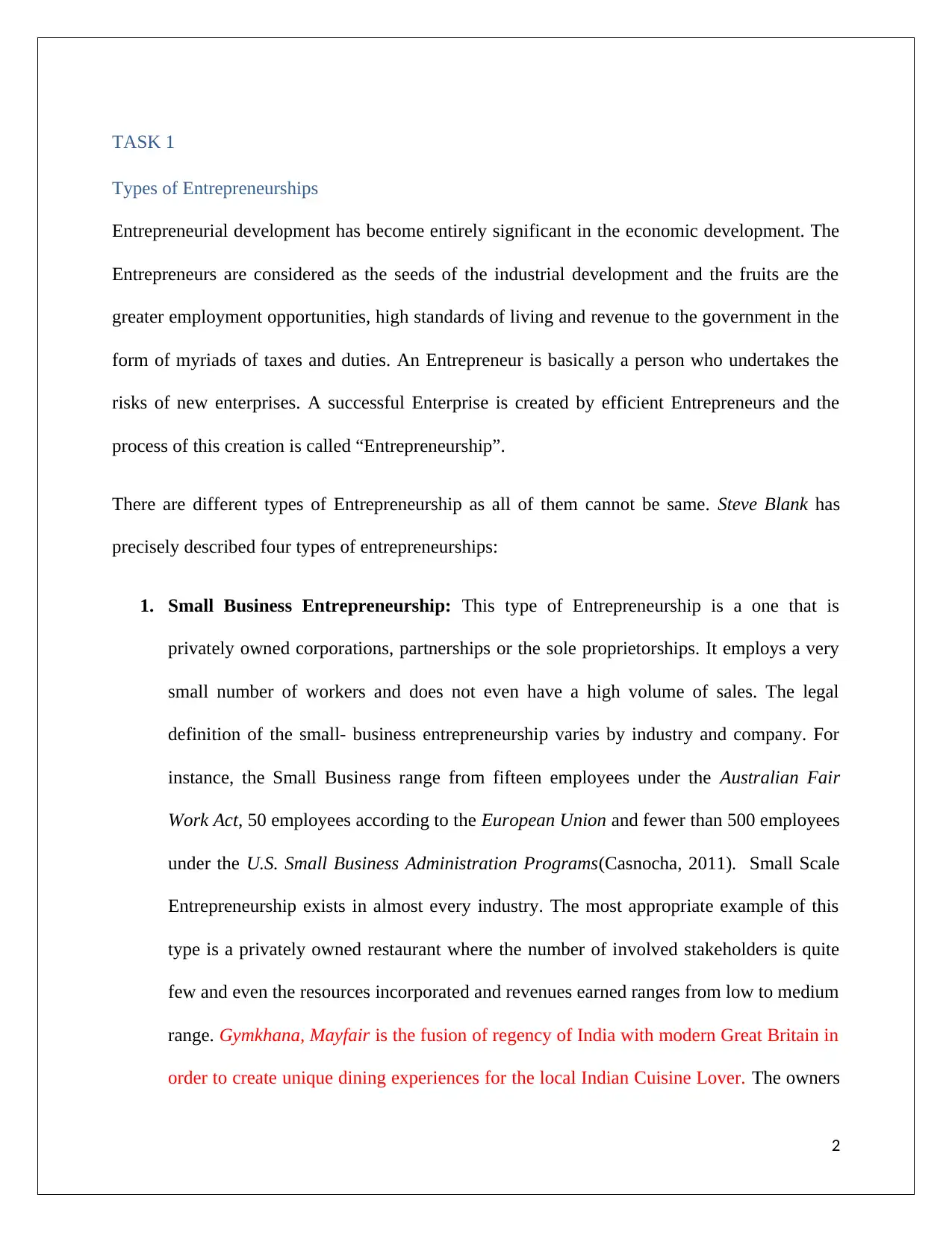
TASK 1
Types of Entrepreneurships
Entrepreneurial development has become entirely significant in the economic development. The
Entrepreneurs are considered as the seeds of the industrial development and the fruits are the
greater employment opportunities, high standards of living and revenue to the government in the
form of myriads of taxes and duties. An Entrepreneur is basically a person who undertakes the
risks of new enterprises. A successful Enterprise is created by efficient Entrepreneurs and the
process of this creation is called “Entrepreneurship”.
There are different types of Entrepreneurship as all of them cannot be same. Steve Blank has
precisely described four types of entrepreneurships:
1. Small Business Entrepreneurship: This type of Entrepreneurship is a one that is
privately owned corporations, partnerships or the sole proprietorships. It employs a very
small number of workers and does not even have a high volume of sales. The legal
definition of the small- business entrepreneurship varies by industry and company. For
instance, the Small Business range from fifteen employees under the Australian Fair
Work Act, 50 employees according to the European Union and fewer than 500 employees
under the U.S. Small Business Administration Programs(Casnocha, 2011). Small Scale
Entrepreneurship exists in almost every industry. The most appropriate example of this
type is a privately owned restaurant where the number of involved stakeholders is quite
few and even the resources incorporated and revenues earned ranges from low to medium
range. Gymkhana, Mayfair is the fusion of regency of India with modern Great Britain in
order to create unique dining experiences for the local Indian Cuisine Lover. The owners
2
Types of Entrepreneurships
Entrepreneurial development has become entirely significant in the economic development. The
Entrepreneurs are considered as the seeds of the industrial development and the fruits are the
greater employment opportunities, high standards of living and revenue to the government in the
form of myriads of taxes and duties. An Entrepreneur is basically a person who undertakes the
risks of new enterprises. A successful Enterprise is created by efficient Entrepreneurs and the
process of this creation is called “Entrepreneurship”.
There are different types of Entrepreneurship as all of them cannot be same. Steve Blank has
precisely described four types of entrepreneurships:
1. Small Business Entrepreneurship: This type of Entrepreneurship is a one that is
privately owned corporations, partnerships or the sole proprietorships. It employs a very
small number of workers and does not even have a high volume of sales. The legal
definition of the small- business entrepreneurship varies by industry and company. For
instance, the Small Business range from fifteen employees under the Australian Fair
Work Act, 50 employees according to the European Union and fewer than 500 employees
under the U.S. Small Business Administration Programs(Casnocha, 2011). Small Scale
Entrepreneurship exists in almost every industry. The most appropriate example of this
type is a privately owned restaurant where the number of involved stakeholders is quite
few and even the resources incorporated and revenues earned ranges from low to medium
range. Gymkhana, Mayfair is the fusion of regency of India with modern Great Britain in
order to create unique dining experiences for the local Indian Cuisine Lover. The owners
2
⊘ This is a preview!⊘
Do you want full access?
Subscribe today to unlock all pages.

Trusted by 1+ million students worldwide
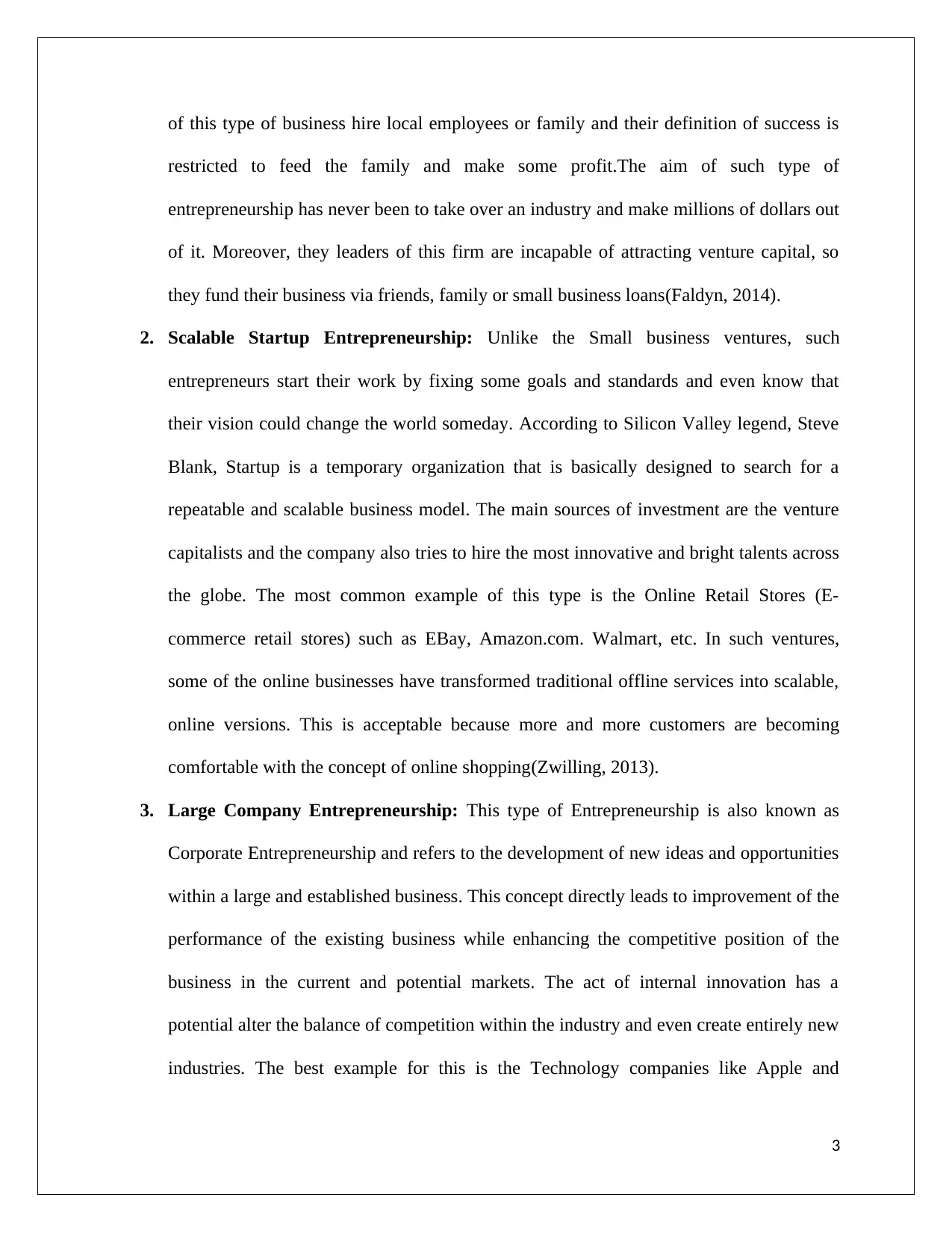
of this type of business hire local employees or family and their definition of success is
restricted to feed the family and make some profit.The aim of such type of
entrepreneurship has never been to take over an industry and make millions of dollars out
of it. Moreover, they leaders of this firm are incapable of attracting venture capital, so
they fund their business via friends, family or small business loans(Faldyn, 2014).
2. Scalable Startup Entrepreneurship: Unlike the Small business ventures, such
entrepreneurs start their work by fixing some goals and standards and even know that
their vision could change the world someday. According to Silicon Valley legend, Steve
Blank, Startup is a temporary organization that is basically designed to search for a
repeatable and scalable business model. The main sources of investment are the venture
capitalists and the company also tries to hire the most innovative and bright talents across
the globe. The most common example of this type is the Online Retail Stores (E-
commerce retail stores) such as EBay, Amazon.com. Walmart, etc. In such ventures,
some of the online businesses have transformed traditional offline services into scalable,
online versions. This is acceptable because more and more customers are becoming
comfortable with the concept of online shopping(Zwilling, 2013).
3. Large Company Entrepreneurship: This type of Entrepreneurship is also known as
Corporate Entrepreneurship and refers to the development of new ideas and opportunities
within a large and established business. This concept directly leads to improvement of the
performance of the existing business while enhancing the competitive position of the
business in the current and potential markets. The act of internal innovation has a
potential alter the balance of competition within the industry and even create entirely new
industries. The best example for this is the Technology companies like Apple and
3
restricted to feed the family and make some profit.The aim of such type of
entrepreneurship has never been to take over an industry and make millions of dollars out
of it. Moreover, they leaders of this firm are incapable of attracting venture capital, so
they fund their business via friends, family or small business loans(Faldyn, 2014).
2. Scalable Startup Entrepreneurship: Unlike the Small business ventures, such
entrepreneurs start their work by fixing some goals and standards and even know that
their vision could change the world someday. According to Silicon Valley legend, Steve
Blank, Startup is a temporary organization that is basically designed to search for a
repeatable and scalable business model. The main sources of investment are the venture
capitalists and the company also tries to hire the most innovative and bright talents across
the globe. The most common example of this type is the Online Retail Stores (E-
commerce retail stores) such as EBay, Amazon.com. Walmart, etc. In such ventures,
some of the online businesses have transformed traditional offline services into scalable,
online versions. This is acceptable because more and more customers are becoming
comfortable with the concept of online shopping(Zwilling, 2013).
3. Large Company Entrepreneurship: This type of Entrepreneurship is also known as
Corporate Entrepreneurship and refers to the development of new ideas and opportunities
within a large and established business. This concept directly leads to improvement of the
performance of the existing business while enhancing the competitive position of the
business in the current and potential markets. The act of internal innovation has a
potential alter the balance of competition within the industry and even create entirely new
industries. The best example for this is the Technology companies like Apple and
3
Paraphrase This Document
Need a fresh take? Get an instant paraphrase of this document with our AI Paraphraser
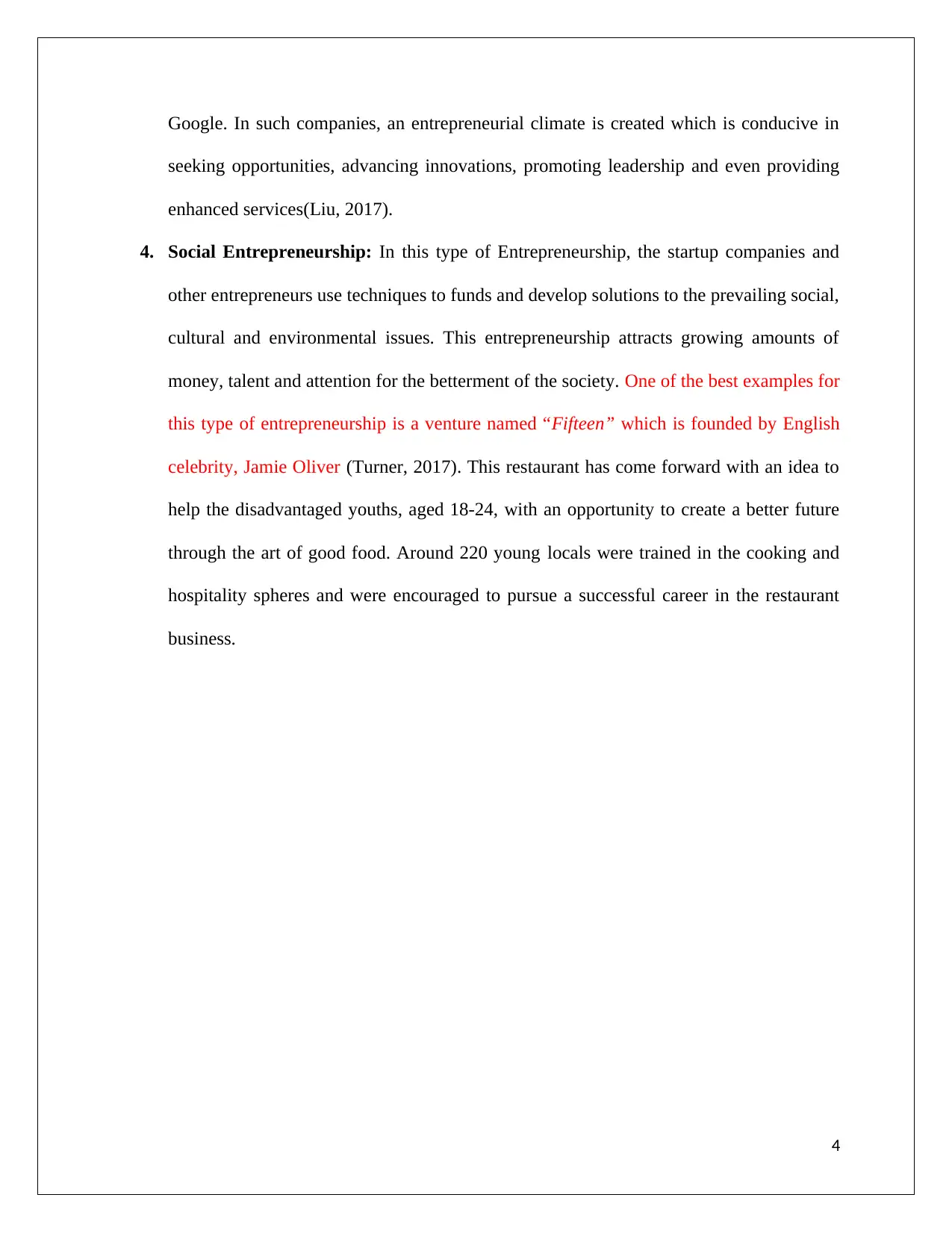
Google. In such companies, an entrepreneurial climate is created which is conducive in
seeking opportunities, advancing innovations, promoting leadership and even providing
enhanced services(Liu, 2017).
4. Social Entrepreneurship: In this type of Entrepreneurship, the startup companies and
other entrepreneurs use techniques to funds and develop solutions to the prevailing social,
cultural and environmental issues. This entrepreneurship attracts growing amounts of
money, talent and attention for the betterment of the society. One of the best examples for
this type of entrepreneurship is a venture named “Fifteen” which is founded by English
celebrity, Jamie Oliver (Turner, 2017). This restaurant has come forward with an idea to
help the disadvantaged youths, aged 18-24, with an opportunity to create a better future
through the art of good food. Around 220 young locals were trained in the cooking and
hospitality spheres and were encouraged to pursue a successful career in the restaurant
business.
4
seeking opportunities, advancing innovations, promoting leadership and even providing
enhanced services(Liu, 2017).
4. Social Entrepreneurship: In this type of Entrepreneurship, the startup companies and
other entrepreneurs use techniques to funds and develop solutions to the prevailing social,
cultural and environmental issues. This entrepreneurship attracts growing amounts of
money, talent and attention for the betterment of the society. One of the best examples for
this type of entrepreneurship is a venture named “Fifteen” which is founded by English
celebrity, Jamie Oliver (Turner, 2017). This restaurant has come forward with an idea to
help the disadvantaged youths, aged 18-24, with an opportunity to create a better future
through the art of good food. Around 220 young locals were trained in the cooking and
hospitality spheres and were encouraged to pursue a successful career in the restaurant
business.
4
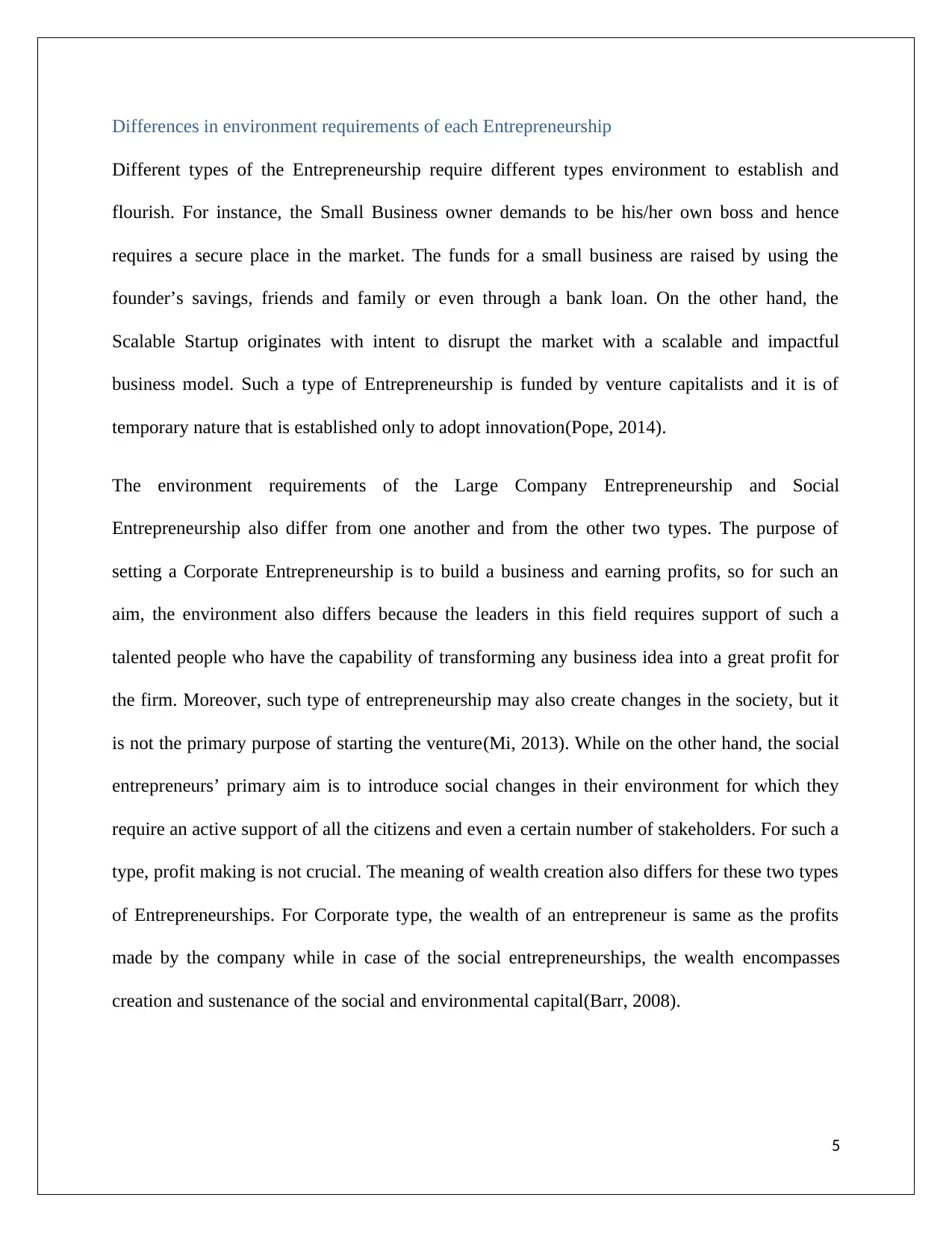
Differences in environment requirements of each Entrepreneurship
Different types of the Entrepreneurship require different types environment to establish and
flourish. For instance, the Small Business owner demands to be his/her own boss and hence
requires a secure place in the market. The funds for a small business are raised by using the
founder’s savings, friends and family or even through a bank loan. On the other hand, the
Scalable Startup originates with intent to disrupt the market with a scalable and impactful
business model. Such a type of Entrepreneurship is funded by venture capitalists and it is of
temporary nature that is established only to adopt innovation(Pope, 2014).
The environment requirements of the Large Company Entrepreneurship and Social
Entrepreneurship also differ from one another and from the other two types. The purpose of
setting a Corporate Entrepreneurship is to build a business and earning profits, so for such an
aim, the environment also differs because the leaders in this field requires support of such a
talented people who have the capability of transforming any business idea into a great profit for
the firm. Moreover, such type of entrepreneurship may also create changes in the society, but it
is not the primary purpose of starting the venture(Mi, 2013). While on the other hand, the social
entrepreneurs’ primary aim is to introduce social changes in their environment for which they
require an active support of all the citizens and even a certain number of stakeholders. For such a
type, profit making is not crucial. The meaning of wealth creation also differs for these two types
of Entrepreneurships. For Corporate type, the wealth of an entrepreneur is same as the profits
made by the company while in case of the social entrepreneurships, the wealth encompasses
creation and sustenance of the social and environmental capital(Barr, 2008).
5
Different types of the Entrepreneurship require different types environment to establish and
flourish. For instance, the Small Business owner demands to be his/her own boss and hence
requires a secure place in the market. The funds for a small business are raised by using the
founder’s savings, friends and family or even through a bank loan. On the other hand, the
Scalable Startup originates with intent to disrupt the market with a scalable and impactful
business model. Such a type of Entrepreneurship is funded by venture capitalists and it is of
temporary nature that is established only to adopt innovation(Pope, 2014).
The environment requirements of the Large Company Entrepreneurship and Social
Entrepreneurship also differ from one another and from the other two types. The purpose of
setting a Corporate Entrepreneurship is to build a business and earning profits, so for such an
aim, the environment also differs because the leaders in this field requires support of such a
talented people who have the capability of transforming any business idea into a great profit for
the firm. Moreover, such type of entrepreneurship may also create changes in the society, but it
is not the primary purpose of starting the venture(Mi, 2013). While on the other hand, the social
entrepreneurs’ primary aim is to introduce social changes in their environment for which they
require an active support of all the citizens and even a certain number of stakeholders. For such a
type, profit making is not crucial. The meaning of wealth creation also differs for these two types
of Entrepreneurships. For Corporate type, the wealth of an entrepreneur is same as the profits
made by the company while in case of the social entrepreneurships, the wealth encompasses
creation and sustenance of the social and environmental capital(Barr, 2008).
5
⊘ This is a preview!⊘
Do you want full access?
Subscribe today to unlock all pages.

Trusted by 1+ million students worldwide
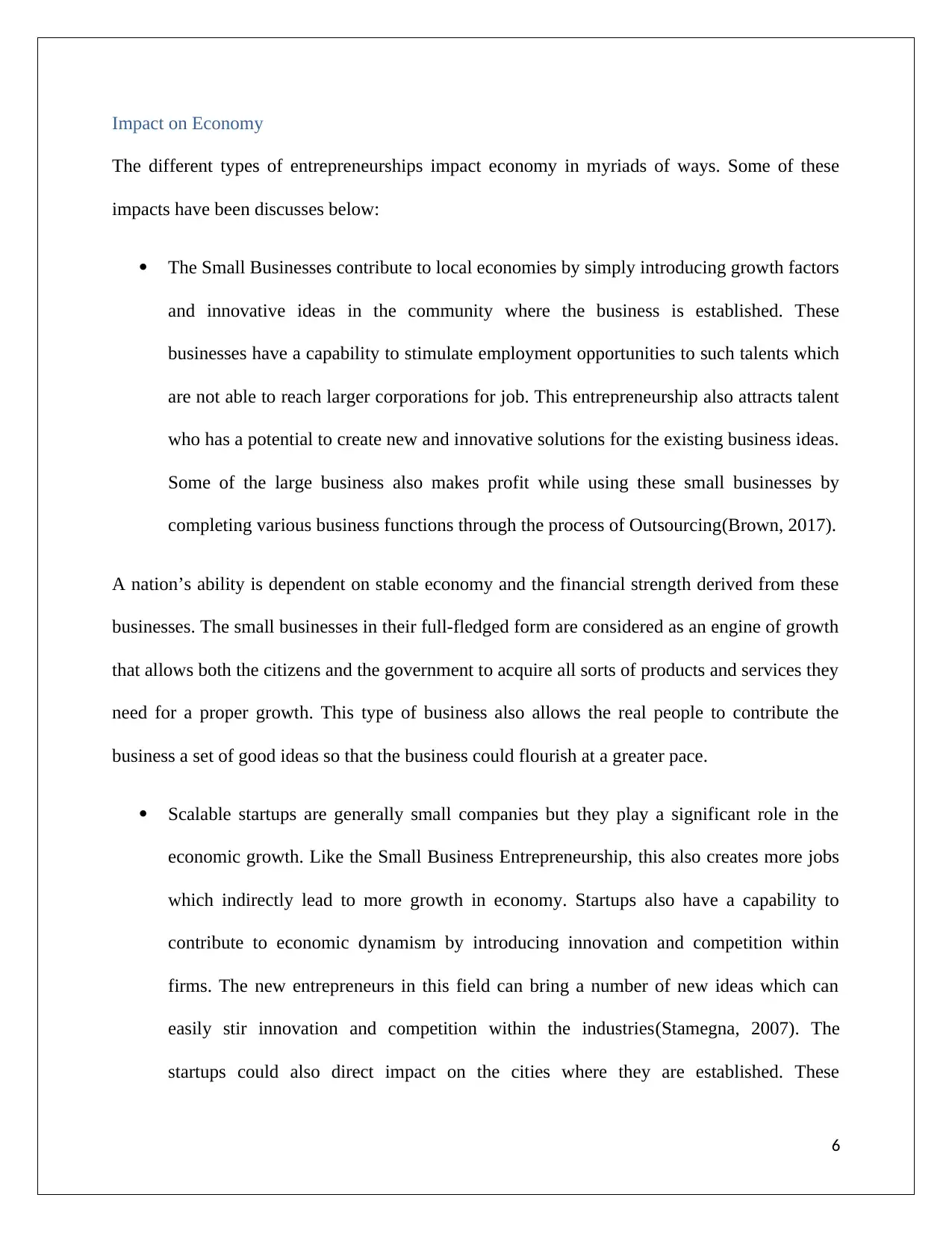
Impact on Economy
The different types of entrepreneurships impact economy in myriads of ways. Some of these
impacts have been discusses below:
The Small Businesses contribute to local economies by simply introducing growth factors
and innovative ideas in the community where the business is established. These
businesses have a capability to stimulate employment opportunities to such talents which
are not able to reach larger corporations for job. This entrepreneurship also attracts talent
who has a potential to create new and innovative solutions for the existing business ideas.
Some of the large business also makes profit while using these small businesses by
completing various business functions through the process of Outsourcing(Brown, 2017).
A nation’s ability is dependent on stable economy and the financial strength derived from these
businesses. The small businesses in their full-fledged form are considered as an engine of growth
that allows both the citizens and the government to acquire all sorts of products and services they
need for a proper growth. This type of business also allows the real people to contribute the
business a set of good ideas so that the business could flourish at a greater pace.
Scalable startups are generally small companies but they play a significant role in the
economic growth. Like the Small Business Entrepreneurship, this also creates more jobs
which indirectly lead to more growth in economy. Startups also have a capability to
contribute to economic dynamism by introducing innovation and competition within
firms. The new entrepreneurs in this field can bring a number of new ideas which can
easily stir innovation and competition within the industries(Stamegna, 2007). The
startups could also direct impact on the cities where they are established. These
6
The different types of entrepreneurships impact economy in myriads of ways. Some of these
impacts have been discusses below:
The Small Businesses contribute to local economies by simply introducing growth factors
and innovative ideas in the community where the business is established. These
businesses have a capability to stimulate employment opportunities to such talents which
are not able to reach larger corporations for job. This entrepreneurship also attracts talent
who has a potential to create new and innovative solutions for the existing business ideas.
Some of the large business also makes profit while using these small businesses by
completing various business functions through the process of Outsourcing(Brown, 2017).
A nation’s ability is dependent on stable economy and the financial strength derived from these
businesses. The small businesses in their full-fledged form are considered as an engine of growth
that allows both the citizens and the government to acquire all sorts of products and services they
need for a proper growth. This type of business also allows the real people to contribute the
business a set of good ideas so that the business could flourish at a greater pace.
Scalable startups are generally small companies but they play a significant role in the
economic growth. Like the Small Business Entrepreneurship, this also creates more jobs
which indirectly lead to more growth in economy. Startups also have a capability to
contribute to economic dynamism by introducing innovation and competition within
firms. The new entrepreneurs in this field can bring a number of new ideas which can
easily stir innovation and competition within the industries(Stamegna, 2007). The
startups could also direct impact on the cities where they are established. These
6
Paraphrase This Document
Need a fresh take? Get an instant paraphrase of this document with our AI Paraphraser
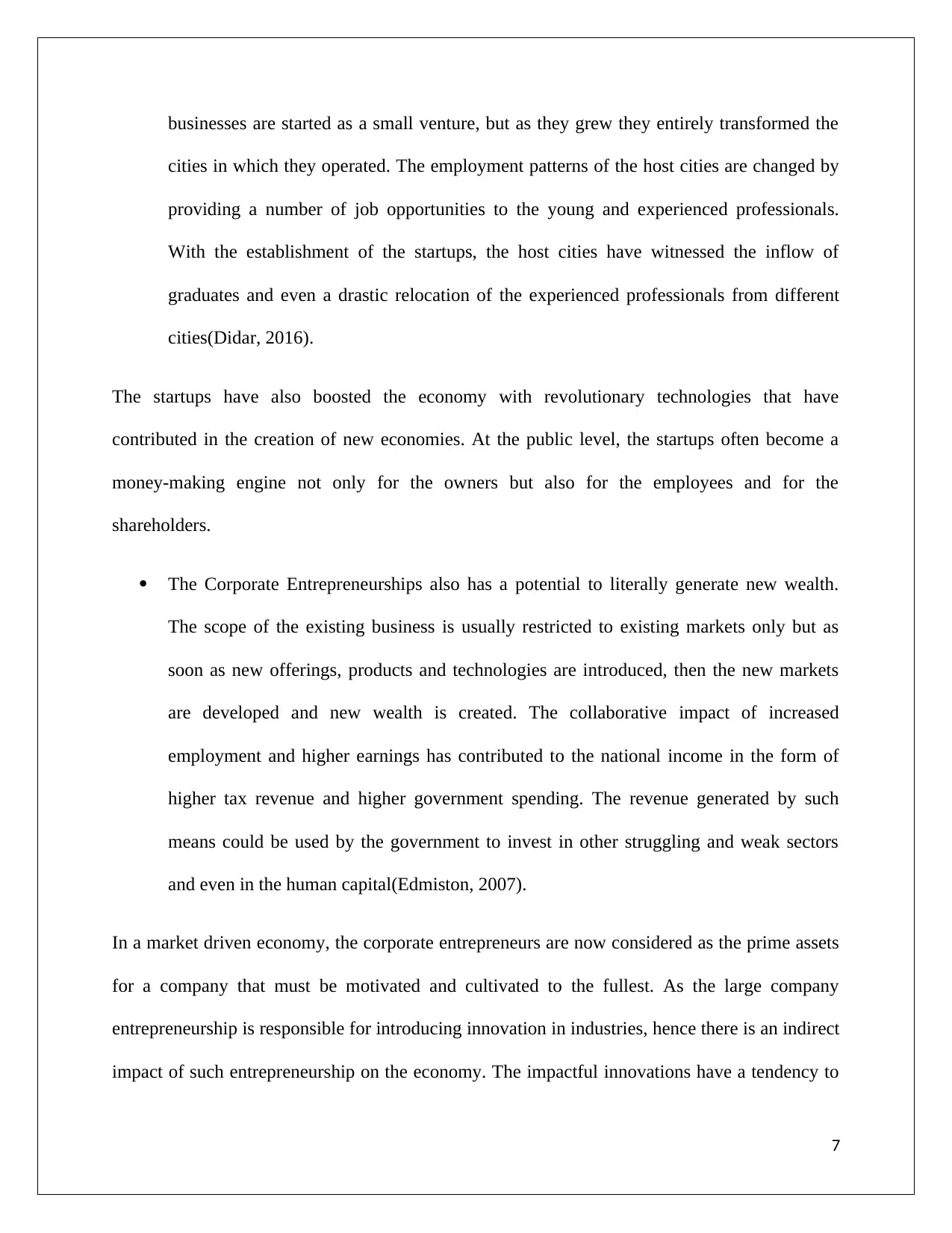
businesses are started as a small venture, but as they grew they entirely transformed the
cities in which they operated. The employment patterns of the host cities are changed by
providing a number of job opportunities to the young and experienced professionals.
With the establishment of the startups, the host cities have witnessed the inflow of
graduates and even a drastic relocation of the experienced professionals from different
cities(Didar, 2016).
The startups have also boosted the economy with revolutionary technologies that have
contributed in the creation of new economies. At the public level, the startups often become a
money-making engine not only for the owners but also for the employees and for the
shareholders.
The Corporate Entrepreneurships also has a potential to literally generate new wealth.
The scope of the existing business is usually restricted to existing markets only but as
soon as new offerings, products and technologies are introduced, then the new markets
are developed and new wealth is created. The collaborative impact of increased
employment and higher earnings has contributed to the national income in the form of
higher tax revenue and higher government spending. The revenue generated by such
means could be used by the government to invest in other struggling and weak sectors
and even in the human capital(Edmiston, 2007).
In a market driven economy, the corporate entrepreneurs are now considered as the prime assets
for a company that must be motivated and cultivated to the fullest. As the large company
entrepreneurship is responsible for introducing innovation in industries, hence there is an indirect
impact of such entrepreneurship on the economy. The impactful innovations have a tendency to
7
cities in which they operated. The employment patterns of the host cities are changed by
providing a number of job opportunities to the young and experienced professionals.
With the establishment of the startups, the host cities have witnessed the inflow of
graduates and even a drastic relocation of the experienced professionals from different
cities(Didar, 2016).
The startups have also boosted the economy with revolutionary technologies that have
contributed in the creation of new economies. At the public level, the startups often become a
money-making engine not only for the owners but also for the employees and for the
shareholders.
The Corporate Entrepreneurships also has a potential to literally generate new wealth.
The scope of the existing business is usually restricted to existing markets only but as
soon as new offerings, products and technologies are introduced, then the new markets
are developed and new wealth is created. The collaborative impact of increased
employment and higher earnings has contributed to the national income in the form of
higher tax revenue and higher government spending. The revenue generated by such
means could be used by the government to invest in other struggling and weak sectors
and even in the human capital(Edmiston, 2007).
In a market driven economy, the corporate entrepreneurs are now considered as the prime assets
for a company that must be motivated and cultivated to the fullest. As the large company
entrepreneurship is responsible for introducing innovation in industries, hence there is an indirect
impact of such entrepreneurship on the economy. The impactful innovations have a tendency to
7

either solve a problem or satisfy the needs of the stakeholders in anew and cost effective
ways(Carree & Thurik, 2002).
The presence of Social Entrepreneurships in those areas where public services are poor is
particularly important. These ventures have the capability to fill the massive social
service gaps in the regions where resources are exceedingly scarce and the population is
quite dense. The Social Ventures also offers insurance against the public policy changes,
government budget cuts and corporate restructuring. Apart from this, the social
entrepreneurships add to economic development by creation of jobs and other
entrepreneurial ventures. This approach supports the economy by improving the quality
of life of the citizens and workforce and vocational job trainings for the high school
graduates(McElnea, 2005).
8
ways(Carree & Thurik, 2002).
The presence of Social Entrepreneurships in those areas where public services are poor is
particularly important. These ventures have the capability to fill the massive social
service gaps in the regions where resources are exceedingly scarce and the population is
quite dense. The Social Ventures also offers insurance against the public policy changes,
government budget cuts and corporate restructuring. Apart from this, the social
entrepreneurships add to economic development by creation of jobs and other
entrepreneurial ventures. This approach supports the economy by improving the quality
of life of the citizens and workforce and vocational job trainings for the high school
graduates(McElnea, 2005).
8
⊘ This is a preview!⊘
Do you want full access?
Subscribe today to unlock all pages.

Trusted by 1+ million students worldwide
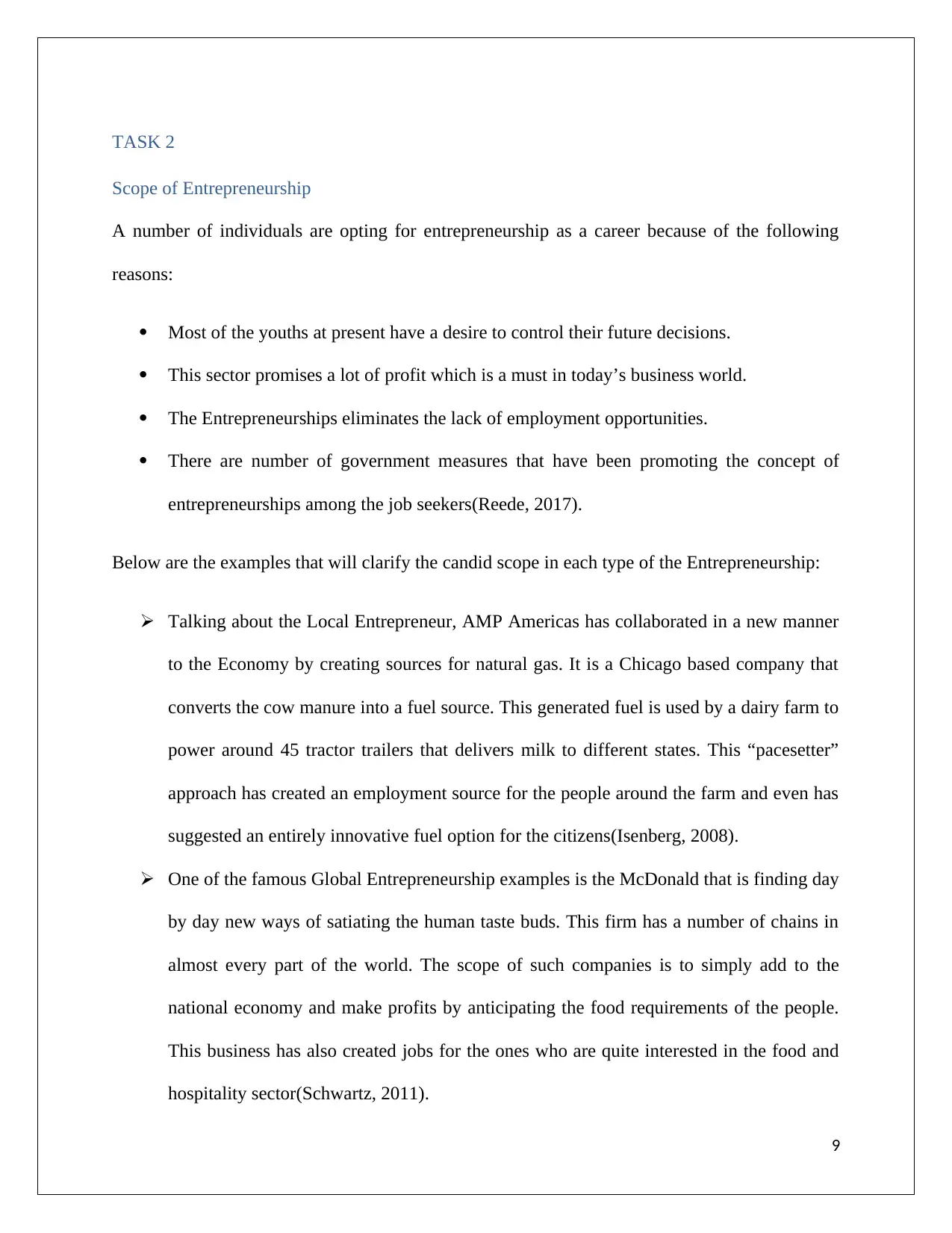
TASK 2
Scope of Entrepreneurship
A number of individuals are opting for entrepreneurship as a career because of the following
reasons:
Most of the youths at present have a desire to control their future decisions.
This sector promises a lot of profit which is a must in today’s business world.
The Entrepreneurships eliminates the lack of employment opportunities.
There are number of government measures that have been promoting the concept of
entrepreneurships among the job seekers(Reede, 2017).
Below are the examples that will clarify the candid scope in each type of the Entrepreneurship:
Talking about the Local Entrepreneur, AMP Americas has collaborated in a new manner
to the Economy by creating sources for natural gas. It is a Chicago based company that
converts the cow manure into a fuel source. This generated fuel is used by a dairy farm to
power around 45 tractor trailers that delivers milk to different states. This “pacesetter”
approach has created an employment source for the people around the farm and even has
suggested an entirely innovative fuel option for the citizens(Isenberg, 2008).
One of the famous Global Entrepreneurship examples is the McDonald that is finding day
by day new ways of satiating the human taste buds. This firm has a number of chains in
almost every part of the world. The scope of such companies is to simply add to the
national economy and make profits by anticipating the food requirements of the people.
This business has also created jobs for the ones who are quite interested in the food and
hospitality sector(Schwartz, 2011).
9
Scope of Entrepreneurship
A number of individuals are opting for entrepreneurship as a career because of the following
reasons:
Most of the youths at present have a desire to control their future decisions.
This sector promises a lot of profit which is a must in today’s business world.
The Entrepreneurships eliminates the lack of employment opportunities.
There are number of government measures that have been promoting the concept of
entrepreneurships among the job seekers(Reede, 2017).
Below are the examples that will clarify the candid scope in each type of the Entrepreneurship:
Talking about the Local Entrepreneur, AMP Americas has collaborated in a new manner
to the Economy by creating sources for natural gas. It is a Chicago based company that
converts the cow manure into a fuel source. This generated fuel is used by a dairy farm to
power around 45 tractor trailers that delivers milk to different states. This “pacesetter”
approach has created an employment source for the people around the farm and even has
suggested an entirely innovative fuel option for the citizens(Isenberg, 2008).
One of the famous Global Entrepreneurship examples is the McDonald that is finding day
by day new ways of satiating the human taste buds. This firm has a number of chains in
almost every part of the world. The scope of such companies is to simply add to the
national economy and make profits by anticipating the food requirements of the people.
This business has also created jobs for the ones who are quite interested in the food and
hospitality sector(Schwartz, 2011).
9
Paraphrase This Document
Need a fresh take? Get an instant paraphrase of this document with our AI Paraphraser

Lack of clean and accessible drinking water is considered as a problem for millions of
people across the world and to mitigate it, a club promoter Scott Harrison came forward.
He began to raise the charity with a prime motive of delivering clean and hygienic
drinking water across the world and due to his efforts; more than a million people are
receiving clean water over 17 countries in the world. Despite a major economic crisis in
the year 2011, his organization made 100% profit in the first quarter of that year. The
scope of such enterprises is not only limited to make profits but also to provide basic
amenities to the people who are actually in need.
10
people across the world and to mitigate it, a club promoter Scott Harrison came forward.
He began to raise the charity with a prime motive of delivering clean and hygienic
drinking water across the world and due to his efforts; more than a million people are
receiving clean water over 17 countries in the world. Despite a major economic crisis in
the year 2011, his organization made 100% profit in the first quarter of that year. The
scope of such enterprises is not only limited to make profits but also to provide basic
amenities to the people who are actually in need.
10
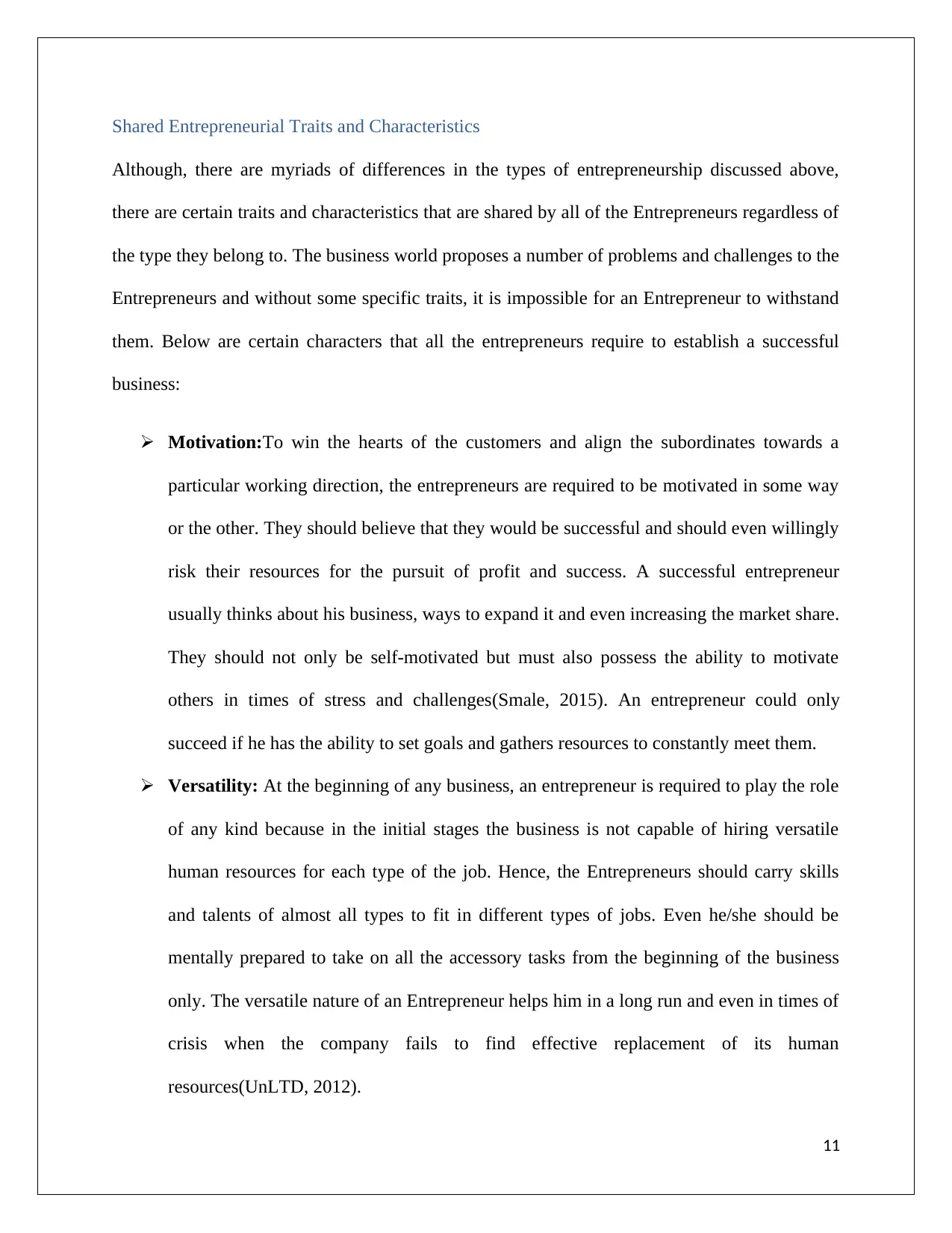
Shared Entrepreneurial Traits and Characteristics
Although, there are myriads of differences in the types of entrepreneurship discussed above,
there are certain traits and characteristics that are shared by all of the Entrepreneurs regardless of
the type they belong to. The business world proposes a number of problems and challenges to the
Entrepreneurs and without some specific traits, it is impossible for an Entrepreneur to withstand
them. Below are certain characters that all the entrepreneurs require to establish a successful
business:
Motivation:To win the hearts of the customers and align the subordinates towards a
particular working direction, the entrepreneurs are required to be motivated in some way
or the other. They should believe that they would be successful and should even willingly
risk their resources for the pursuit of profit and success. A successful entrepreneur
usually thinks about his business, ways to expand it and even increasing the market share.
They should not only be self-motivated but must also possess the ability to motivate
others in times of stress and challenges(Smale, 2015). An entrepreneur could only
succeed if he has the ability to set goals and gathers resources to constantly meet them.
Versatility: At the beginning of any business, an entrepreneur is required to play the role
of any kind because in the initial stages the business is not capable of hiring versatile
human resources for each type of the job. Hence, the Entrepreneurs should carry skills
and talents of almost all types to fit in different types of jobs. Even he/she should be
mentally prepared to take on all the accessory tasks from the beginning of the business
only. The versatile nature of an Entrepreneur helps him in a long run and even in times of
crisis when the company fails to find effective replacement of its human
resources(UnLTD, 2012).
11
Although, there are myriads of differences in the types of entrepreneurship discussed above,
there are certain traits and characteristics that are shared by all of the Entrepreneurs regardless of
the type they belong to. The business world proposes a number of problems and challenges to the
Entrepreneurs and without some specific traits, it is impossible for an Entrepreneur to withstand
them. Below are certain characters that all the entrepreneurs require to establish a successful
business:
Motivation:To win the hearts of the customers and align the subordinates towards a
particular working direction, the entrepreneurs are required to be motivated in some way
or the other. They should believe that they would be successful and should even willingly
risk their resources for the pursuit of profit and success. A successful entrepreneur
usually thinks about his business, ways to expand it and even increasing the market share.
They should not only be self-motivated but must also possess the ability to motivate
others in times of stress and challenges(Smale, 2015). An entrepreneur could only
succeed if he has the ability to set goals and gathers resources to constantly meet them.
Versatility: At the beginning of any business, an entrepreneur is required to play the role
of any kind because in the initial stages the business is not capable of hiring versatile
human resources for each type of the job. Hence, the Entrepreneurs should carry skills
and talents of almost all types to fit in different types of jobs. Even he/she should be
mentally prepared to take on all the accessory tasks from the beginning of the business
only. The versatile nature of an Entrepreneur helps him in a long run and even in times of
crisis when the company fails to find effective replacement of its human
resources(UnLTD, 2012).
11
⊘ This is a preview!⊘
Do you want full access?
Subscribe today to unlock all pages.

Trusted by 1+ million students worldwide
1 out of 20
Related Documents
Your All-in-One AI-Powered Toolkit for Academic Success.
+13062052269
info@desklib.com
Available 24*7 on WhatsApp / Email
![[object Object]](/_next/static/media/star-bottom.7253800d.svg)
Unlock your academic potential
Copyright © 2020–2026 A2Z Services. All Rights Reserved. Developed and managed by ZUCOL.



